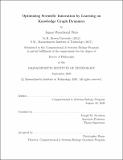| dc.contributor.advisor | Joseph M. Jacobson. | en_US |
| dc.contributor.author | Weis, James W.(James Woodward) | en_US |
| dc.contributor.other | Massachusetts Institute of Technology. Computational and Systems Biology Program. | en_US |
| dc.date.accessioned | 2021-01-06T19:32:30Z | |
| dc.date.available | 2021-01-06T19:32:30Z | |
| dc.date.copyright | 2020 | en_US |
| dc.date.issued | 2020 | en_US |
| dc.identifier.uri | https://hdl.handle.net/1721.1/129206 | |
| dc.description | Thesis: Ph. D., Massachusetts Institute of Technology, Computational and Systems Biology Program, 2020 | en_US |
| dc.description | Cataloged from student-submitted PDF of thesis. | en_US |
| dc.description | Includes bibliographical references (pages 142-151). | en_US |
| dc.description.abstract | The integration of data-driven methodologies, including techniques from artificial intelligence and network science, into the research process and funding ecosystem is an exciting, potentially paradigm-changing opportunity to augment the effective intelligence of the scientific community--potentially increasing the efficiency, fairness, and overall impact of the scientific enterprise. In this thesis, we explore the development of new technologies to extract actionable insights from large-scale data corpora through the design and deployment of machine learning approaches. | en_US |
| dc.description.abstract | Specifically, we describe (1) the creation of new algorithms that compute on simulations of complex biophysical processes to generate novel scientific insights, (2) artificial intelligence-based improvements to the academic publishing system, (3) a study of institutional barriers bottle-necking the development of large-scale algorithmic approaches to scientific knowledge analysis, and (4) a new algorithmic framework that, by learning from the history of biotechnology innovation as models by dynamic knowledge graphs, is able to identify with high-fidelity new technologies of likely high future impact. We also develop tools to facilitate the real-world utilization of these quantitative approaches, effectively demonstrating how theses "intelligence-augmenting" algorithms could be used to more efficiently navigate the scientific literature and design scientifically impactful collaborations. | en_US |
| dc.description.abstract | Finally, we conclude by discussing the potential deployment of these technologies in the future--with a focus on potential applications in the funding of scientific research and commercialization, and the potential design of diversified, impact-optimized funding portfolios. Collectively, our results demonstrate that machine learning approaches can be used to extract meaningful insight from existing data corpora, and that these signals can be used synergistically with human intuition to increase the rate at which we collectively generate breakthrough scientific insights and transformative new technologies. | en_US |
| dc.description.statementofresponsibility | by James Woodward Weis. | en_US |
| dc.format.extent | 151 pages | en_US |
| dc.language.iso | eng | en_US |
| dc.publisher | Massachusetts Institute of Technology | en_US |
| dc.rights | MIT theses may be protected by copyright. Please reuse MIT thesis content according to the MIT Libraries Permissions Policy, which is available through the URL provided. | en_US |
| dc.rights.uri | http://dspace.mit.edu/handle/1721.1/7582 | en_US |
| dc.subject | Computational and Systems Biology Program. | en_US |
| dc.title | Optimizing scientific innovation by learning on knowledge graph dynamics | en_US |
| dc.type | Thesis | en_US |
| dc.description.degree | Ph. D. | en_US |
| dc.contributor.department | Massachusetts Institute of Technology. Computational and Systems Biology Program | en_US |
| dc.identifier.oclc | 1227507401 | en_US |
| dc.description.collection | Ph.D. Massachusetts Institute of Technology, Computational and Systems Biology Program | en_US |
| dspace.imported | 2021-01-06T19:32:29Z | en_US |
| mit.thesis.degree | Doctoral | en_US |
| mit.thesis.department | CSB | en_US |
